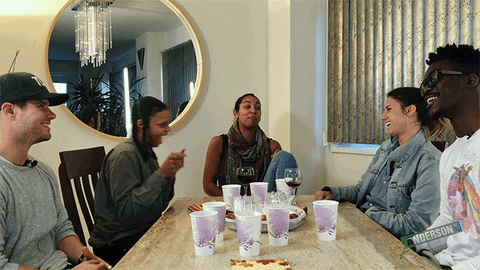Community Managers are unique team members in that they typically have the highest [and possibly, most familiar] touch with your consumer base and thus, they have some soft characteristics that may differentiate them from your everyday hard-skilled coworkers. This is a compilation of the areas that community managers differ most, in my opinion, and what makes them invaluable. Here are my take on top community manager skills:
Empathy & Emotional Intelligence

Third Eye Love GIF By Cienna Smith
Sheesh, empathy is more than just a buzzword here! For those of us that have always had a particular knack for feeling the vibe immediately upon walking into a room, or being a person that chose to sit on the side for a while to assess the situation before engaging, or simply proving to be the person that everyone spills the beans to repeatedly — if these were ever you, welcome home.
Empathy is an absolute innate necessity in those that accept this role because, essentially, you are the peoples’ person. The people will first dip a toe into your community manager atmosphere, then quickly see that you’re accessible and warm, which may avalanche into the arena of not quite knowing the boundary line between being seen as a friend and being seen as the authoritative admin figure. So, beware, empathy is great but a fine line it is.
Having empathy is vital when navigating the initially tumultuous yet inevitably placid waters of asserting your confident authority, without much of that residual baggage [you know! the mega ego, the inability to delegate, the constant uncertainty of if your decisions are valid or will they even be adhered to].
Practicing empathy in the day2day can be anything along these lines: when re reading a message — take out at least half of the sentences that start with ‘I’ and rewrite them to include ‘what I think I’ve heard from you is’ or ‘you mentioned that…and I think…’, directly reaching out when you know someone in your community is struggling [ie. maybe you glean this from any of the channels they’re writing in], knowing what’s going on in the world of your customer base [ie. if you work with medical students, it might be prudent to have a google alert set up and know when big happenings occur in their world].
Why? What’s the point of having a community if you’re not planning to engage to the best of your capacity? At the end of the day, you have to give a little [of yourself] to get a little more [of your members].
Communication & Active Listening This is tied for #1 imo, but let’s face it, empathetic communication means one has to work on that empathy piece first, in order to integrate it with an existing communication style. Communication in particular is MAJOR for me; even as a high school student, I put a ton of pride in myself for my communication style and capacity. I found it fun and as the ultimate tool [or weapon, yikes] for establishing what you want. Albeit we didn’t have a debate club [I don’t think], I did speak at events including our graduation to over 2K people and I loved every second. Communication is part of my identity, so feel free to take much of what I say in this area with a grain of salt.

Anderson Street Web Series | 2018
When I’m talking about communication, I’m really talking about being as direct as possible in your communication. It’s the lessening of blurry language [let’s make an agenda for that or we should do that next week], gauging when it’s best to be colloquial [slang or not to slang is always my question], assessing and adjusting to your audience [maybe you need to post the message on slack AND email], determining whether a short video might be better than a three paragraph email, being judicious with punctuation and instead just using that dang period [.] to get your point across. Direct communication takes practice, isn’t typically your default and is best with an accountability partner to keep you up to snuff.
We’re living in a very nice, polite, passive aggressive era where most of our communication is now done online and in chats, forums, social media and you know the rest. Misinterpretation is at its peak these days and all you have to do is, say nah, this isn’t working for me in order to course correct. As a community manager, everyone you come into contact with should understand you at least 95% of the time [only because I struggle in believing there’s ever truly 100%]. Direct communication can eradicate all that annoying noise, like redundancy, imposter syndrome, or the emailed back and forths to settle on a meeting time. It can also greatly increase your confidence, position, influence and dare I say, self worth.
The other side of this sword is of course, being able to actively listen to those in your community. Best place to start, is to ask your parents or older family members a probing question that should have a long & drawn answer, and give them your undivided attention. It’s often from our closest tribe that we accidentally give less of our time or attention, because we assume they’ll always be there. Give every instance your best self, and if you feel you can’t, reschedule.
Regardless of love languages, I’m going on a limb here in saying that 100% [whoa] of people want to be HEARD, SEEN & UNDERSTOOD. This can be one of the most significant gifts you can give a person; your time and attention.
Initiative The biggest difference between initiative and the often seen as synonymous, problem solving, is that initiative is with foresight and extends into the long term. Problem solving is typically reactionary, rushed and needs to be consistently readjusted along the way. My tendency, if time allows, is to take initiative when I can start to see the creeping of a pattern.
For example, when I was a program leader for Remote Year Earhart, we were heading into our first continent shift [Europe to South East Asia, SEA] after a spate of unfortunate events. The high honeymoon phase of month one, dribbled into the everyone-has-the-flu month two, knocked into a doozy of racially instigated violence that affected several of my charges and had serious residual effects on my community and the company. A positive is, my group was able to write to several guide books like Rick Steves and get a certain establishment taken out of their guide, and a negative was that, my group was falling apart at the seams and we had nine months left. Right.
My work wife and I got crackin. Chatted with veteran program leaders, dissected how we would feel as individuals on this trip while also identifying with a group that wasn’t in agreement, as well as how to respond officially to certain woes that people had with the company. It was truly messy; I think, as messy as it can get. We tried to take initiative in considering how our group could meld back together over the course of three months in SEA through facilitated workshops, adjustment of the monthly town halls to leave ample time for open discussion, increased 1x1 coffee sessions with each person, and activities relating to homesickness. These things matter.

Homemade Friends&Thanksgiving in Malaysia | Remote Year 2017
People can’t and shouldn’t have to do it all alone and as community manager, it’s vital to set up the space and let it rock [with some light oversight!]
Advocacy
If you’re not riding for your community, you’re taking away from it. I don’t think it’s necessary to have lived in the same shoes as those in your community, for example I don’t think it’s necessary that you are a prolific permaculture maven in order to orchestrate a significant space for gardeners. However, I do think it’s imperative that you 1. care about their realm at least enough to research it and set a few google alerts as well as 2. know how and when to stand up for them.
Advocacy looks like, setting up boundaries with certain team members by letting them know that your community is not a free candy machine, ready and willing at any moment to serve your team. A solid reminder is that any relationship requires give and take, and often with community, I like to think it’s two more gives before one take. So if you want a focus group, ensure there are two options for gratitude expression or the give[ie. gamification, gift cards, badges, letters of recommendation, et al].
Advocacy is also, beyond sharing the community guidelines repeatedly, it can be taking a stand as admin and letting people know where that line is. This thing you said is okay, this way you impacted our community is not okay. We return to direct communication whereby we have to learn how to fasten a tight, concise message that can’t be misconstrued, but is also not perceived as mean nor can be taken too personally/offensively.
Finesse, is crucial; and mistakes are made every step of the way, but it’s about keeping yourself as a community manager to a smidgen of a higher standard.
Cultural Sensitivity

Culture isn’t just regional, racial or ethnic. It’s any subset of a population like sex, ability, religion, and so on. Being aware of who makes up your community and not necessarily catering to them, but rather being as inclusive as you can muster. If you can’t, no worries, your community loves being asked for their opinions :) Use your community to improve how said community is affected by you and others within in.
While at Osmosis I was able to co create our excellent [imo] community guidelines with a particular shout out to cultural sensitivity, with a core group of the community. I created the skeleton of a google doc and shared it with this core group of ten, along with rules of how we’d communicate about this doc with each other as well as a deadline. It was magic. We worked together asynchronously to create a three page, infographic set of community guidelines that are our absolute pillars.
Honorable Mention Ten
Patience [people need at least seven reminders before they remember…sorry]
Creativity [learn how to figure it out, all.the.time]
Humor [comic relief matters!]
Adaptability [not synonymous with flexibility]
Pattern recognition [great for data analytics & foresight]
Research acumen [so you can understand your niche]
Trustworthy [you want people to feel comfortable in your presence]
Collaborative [elbow your way to the table where other teams are, and learn to integrate with them]
Curiosity [tools, apps, websites, automation are cropping up daily and it would behove you to see what to use and how to use them]
Reach out [connect with community comrades online, asking for help, brainstorm with others, recognize that you don’t know it all and you don’t have to]
